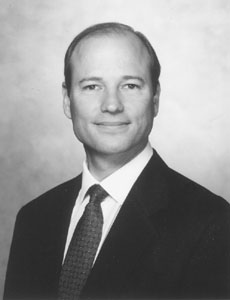Vision Enhanced
Of Neanderthals, therapists and hedgehogs 4 Prez
By Richard Sine
Everyone slams the two major candidates in this year's presidential elections for a lack of "vision." Well, there was plenty of vision at last week's Third Party Debate at Stanford University. Like the crystal-clear vision that follows a traumatic blow to the head.
To our left on the red-curtained stage we had Howard Phillips, crown jewel of the U.S. Taxpayers party. Phillips is a blocky, scowling man with bushy black eyebrows, deep-set eyes and recessive forehead, whose views are as Paleolithic as his appearance. He's an outgrowth of the Patriot movement, with its Founding Fathers fetish and conviction that every law not in the Constitution or the Bible is fraudulent. In the debate he expressed his desire to publish the names of prostitutes "just as in the old days when we put people in the stocks."
In the middle we have John Hagelin, pride of the Natural Law Party. A quantum physicist who briefly worked at the Stanford Linear Accelerator, Hagelin literally believes that we can end war, illness and crime if we just got enough people to practice Transcendental Meditation, pioneered by the Maharishi Mahesh Yogi. The stage lights shined off the top of Hagelin's pill-shaped head, producing a kind of aura. The edges of his mouth upturned slightly in a beatific grin. He speech was lilting and vaguely hypnotic. It is not hard to picture him at Camp David, telling Yasser Arafat: "You seem hostile."
Finally there was Libertarian candidate Harry Browne. The majority of the 400 or so in the audience were Brownies who'd heard of the debate from friends or the Internet. Tall, slender and silver-haired, Browne looked like a fox, but played more the part of hedgehog, with his constant mantra, "Government doesn't work." His views sounded fine until they started sounding ridiculous. At one point, he insisted that environmental laws were silly because the worst water pollution was caused by "dumping into government streams."
I can trace my disillusionment with politics to the watching of presidential debates. I was a college student swooning with the fire-wrought purity of radical ideas. I stared at the candidates' faces on the television screen and thought: Their lips are moving, but they're not saying anything.
How apt, then, that this debate took place at a college campus. These folks had plenty to say, and there was certainly more frank discussion of issues like the war on drugs, campaign finance reform and immigration than at the televised debates.
There were also better zingers. Phillips: "We don't need more prisons, we need more executions." Browne: "If we're responsible for the defense of Europe, then what are the Europeans responsible for? The defense of Asia?"
Browne and Hagelin, at least, had done some serious thinking on the issues, and each promoted agendas, like drug legalization and sustainable agriculture, that deserve more attention in the mainstream.
After the debate I pulled Hagelin away from his entourage of tall, soft-spoken therapist types--his Sensitive Service--to ask him why he was tilting at windmills. Hagelin's response: He hopes his party will win a few local seats. And he hopes that if his party is popular enough, the mainstream may be forced to absorb some of his ideas. It's happened before, he says: women's suffrage and the minimum wage were first promoted by third parties.
Hagelin may deserve to be heard, but he certainly doesn't deserve to be president. A nation ruled by therapists may be even scarier than one ruled by businessmen or lawyers. Ideas like libertarianism, Transcendental Meditation and Constitutionalism that sound great in a college classroom gain sinister and totalitarian overtones when you propose to rule the country by their tenets, and take them into the arena of foreign policy.
There's a reason perfectly decent presidential candidates may lack the "vision" so coveted in this and other contests. First of all, they may have a pragmatic streak, which is rather useful in a leader. They may actually be willing to hear ideas other than their own, and be open to compromise. They may not want to promise things they can't deliver--even a president can't do everything.
If Bill Clinton ever really inhaled, he may have had "vision" once, too. But I'm glad he came down before he ran for president.
[ Metro | Metroactive Central | Archives ]
This page was designed and created by the Boulevards team.

Meditative Candidate: John Hagelin of the Natural Law Party hopes that if his party is popular enough, the mainstream may absorb some of his ideas.
From the October 31-November 6, 1996 issue of Metro
![[Metroactive News&Issues]](/gifs/news468.gif)